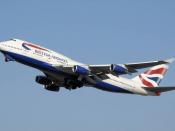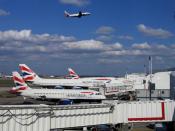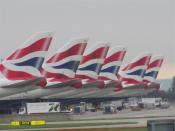CASE STUDY 2 -THE BRITISH AIRWAYS SWIPE CARD DEBACLE 1
The British Airways Swipe Card Debacle (Chapter 8)
Amanda Rector
9/28/2014
MAN4741
Case Study #2
Abstract
British Airways experienced a huge economic loss, as well as reputation loss on Friday, July 18, 2003. Located at the Heathrow Airport in London, British Airways experienced a 24-hour wildcat strike which initially was ran by over 250 check-in staff around 4 p.m. that day and was not organized by trade unions officially. As a result of the strike, British Airways lost 40 million, and its reputation severely denied. British Airways was still in the progress of recovering from other environmental jolts, such as 9/11, the Iraqi war, SARS, and inroads on its markets from budget airlines. During the strike, some 60 departure flights were grounded and over 10,000 passengers left stranded. This was the worst industrial situation for British Airways since 1997.
Overview
The real issue that led to the worst industrial situation was "swipe cards".
British Airways staffs were protesting on behalf of the introduction of a system for electronic clocking-in that would record when they started and finished their work for the day. The staff was ultimately concerned with the system and how managers would be able to manipulate their working patterns and shift hours. The clocking-system was a part of a broader restructuring program in British Airways, titled the Future Size and Shape recovery program. The British Airways management perspective was that they needed to be able to "improve the efficient use of staff and resources". However, the staff's perspective was seen as a "prelude to a radical shake-up in working hours, which would lead to loss of pay and demands to work split shifts". The Future Size and Shape program over the previous two years led to approximately...


